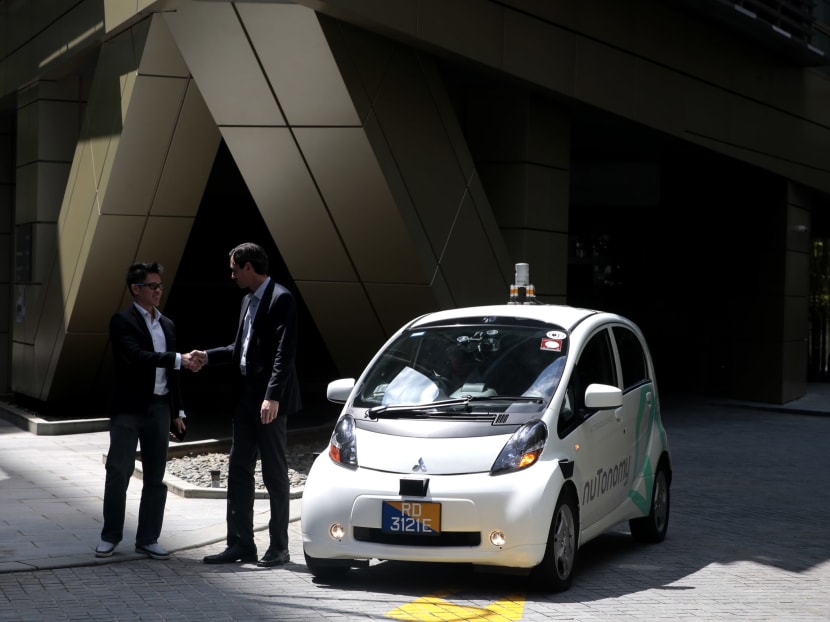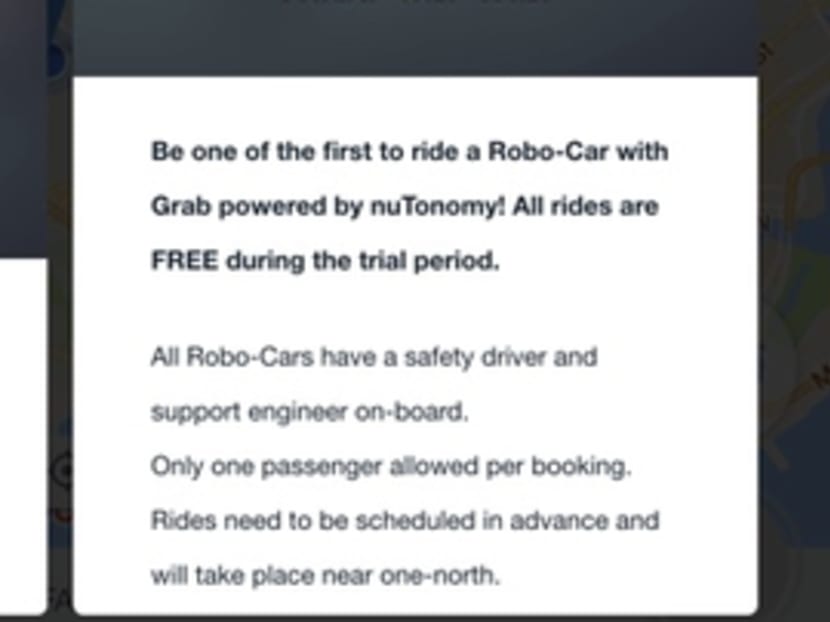Grab users in one-north could get free ride on driverless taxis
SINGAPORE — Members of the public can now book a free trip on a driverless taxi through ride-hailing app Grab, with the service scheduled to start on Monday (Sept 26).

nuTonomy CEO Karl Iagnemma and head of Grab Singapore Lim Kell Jay next to a nuTonomy self driving car on Sept 23, 2016. Photo: Jason Quah
SINGAPORE — Members of the public can now book a free trip on a driverless taxi through ride-hailing app Grab, with the service scheduled to start on Monday (Sept 26).
On Friday, Grab introduced a special “Robo-Car” button which will allow the public to pre-book any of the six nuTonomy self-driving cars being tested in Singapore, and ride for free as part of a two-month trial.
But whether the booking will be accepted will depend on the person’s travel history of riding in or out the one-north business district with Grab, as the trial is looking to satisfy participants “with real trips” to be had, said Mr Lim Kell Jay, head of Grab Singapore.
Users must also be above the age of 18, and sign a liability waiver before riding.

Grab announced its partnership with nuTonomy, the first company in the world to try out self-driving taxis in public, three days after raising US$750 million (S$1.02 billion) in additional funding.
With the public trial, the area that the cars can go driverless in Singapore has been doubled to about 5sqkm in one-north, including the one-north MRT Station. To make that possible, a Land Transport Authority (LTA) spokesperson said a few more roads have been approved for the public testing of driverless vehicles.
A safety driver and a support engineer will be present in the self-driving car to observe system performance and ensure the passenger’s comfort and safety.
If a trip requires travel on roads outside of one-north, or if it starts to rain heavily, the safety driver will take over for that portion of the trip.
Most of the rides will be carried out during normal working hours, with a small number of trip requests at night accepted to study user experience after dark. The spokesman said the company’s technology works regardless of lighting conditions and is fully functional throughout the day.
After two months, both companies said they may extend the trial, as long as it continues to yield valuable feedback and data. Currently, they do not have a fixed number of rides that they are looking for.
When asked about public response to the new feature by yesterday evening, Grab declined to comment.
On Aug 25, nuTonomy beat Uber to the punch by launching its driverless taxi pilot in Singapore, a few weeks before Uber rolled out its own test in Pittsburgh, Pennsylvania. The company’s six modified Renault Zoe and Mitsubishi i-MiEV electric cars have been plying the one-north area at specified pick-up and drop-off points for a dozen invited riders.
Its chief executive officer Karl Iagnemma said that the partnership with Grab to expand its public trial “will yield valuable feedback and consumer insights”, as his company plans to significantly ramp up its testing next year, growing its fleet of self-driving vehicles to dozens by the end of 2019.
It is also working to launch the world’s first commercial autonomous car service in 2018 in Singapore.
Another company, Delphi Automotive Systems, is slated to start conducting trials for such on-demand services for autonomous vehicles at the one-north testbed too.
For Grab, driverless cabs could be a welcome solution for Singapore’s “supply-constrained market”, said Mr Lim. Citing Grab data that passengers in Lim Chu Kang are four times less likely to get a taxi using their app, he said stationing driverless cars in such areas would serve customers better.
Although driverless vehicles in testing elsewhere in the world have shown that they are statistically much safer than human drivers, transport analyst Dr Walter Edgar Theseira said safety and reliability are still the public's concerns at this point. "I see this period as a time not only for the experts to improve the technology, but also as a time for the public to get used to sharing the roads with autonomous vehicles," said the senior lecturer at UniSIM College.
Mr Alvaro Lenza, a business developer who takes a taxi daily from Novena to Synapse in one-north where he works, will be applying for a “Robo-Car” ride. On his morning commute during which he focuses on his day’s agenda, the 28-year-old said: “Honestly, I don’t want to speak to anyone. I would even prefer hailing a driverless car to work to hiring one with a driver.”
Driverless cars are not new in Singapore. A*Star’s version has been on trial in one-north since last year. And in 2013, Nanyang Technological University had tested a driverless shuttle that can carry eight passengers and go up to 20.1kmh on a pre-programmed route.
To get on the road, these autonomous vehicles must adhere to LTA’s requirements announced in January last year. The vehicles are not allowed to go driverless outside the test area.








